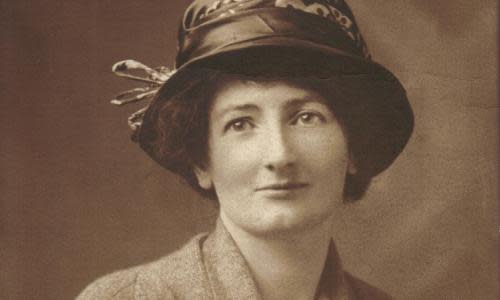Ethel Carnie Holdsworth: campaigners push to revive fame of working-class novelist

Ethel Carnie Holdsworth wrote in 1914 that “literature up till now has been lopsided, dealing with life only from the standpoint of one class”. Now the Lancashire mill worker and author, a forgotten name who is believed to be the first working-class woman in Britain to publish a novel, and who in her heyday outsold HG Wells, is set to be celebrated with an alternative blue plaque and a return to print.
Born in Oswaldtwistle in Lancashire in 1886, Holdsworth began working in a textile factory at the age of 11. She also wrote poetry, saying that the rhythm of the looms helped her compose her lines. Dubbed the “Lancashire mill girl poetess” by the local paper, she came to the attention of journalist Robert Blatchford, who gave her a job on his magazine, the Woman Worker. Holdsworth published her first novel, Miss Nobody, in 1913 and went on to write a further nine. She also set up anti-fascist journal the Clear Light, and helped other working-class women learn to read and write. She stopped writing novels in 1946, worn out by the process according to her daughter.
Although one of her books, Helen of Four Gates, was a hit in the UK and US, outselling Wells twofold and adapted into a silent movie in 1920, her name has largely faded today. But now a group of academics and creatives are setting out to reclaim it.
Pendle Radicals, a research and creative project led by Mid Pennine Arts, is working with art collective Rosie’s Plaques to put up an alternative blue plaque to Holdsworth in Nelson, Lancashire, in early September. Academic Dr Nicola Wilson, meanwhile, is working to republish her fiction, with her long out-of-print novel The House That Jill Built due out next year, the latest in a series of reissues. Pendle Radicals has also created a new podcast series about the author, and placed some of her poems in the Poetry Archive.
“She’s as important as Robert Tressell, and he’s still widely celebrated amongst leftwing readers. Ethel is from a humbler background,” said Wilson. “She wrote more, for years, and she really tried to address a wide audience. Her books are so powerful still, and relevant.”
The House That Jill Built, published in 1924, is believed to be the first novel to focus on women escaping domestic violence. Helen of Four Gates, from 1917, is a dark gothic romance set in the Lancashire hills. Miss Nobody follows the fortunes of Carrie Brown, a “scullery drudge” turned oyster shop owner from Ardwick. And her 1925 novel This Slavery, which Wilson calls her most radical, follows sisters Hester and Rachel Martin, who are left unemployed after a fire at the mill.
“She writes in popular genres – romance, murder mystery, detective stories – and she throws in feminism and socialist politics. She’s really unusual, so radical and still very relevant. She’s quite satirical – I think of people like Jonathan Coe when I read her,” said Wilson. “She was partly forgotten because she didn’t write for the last 30-odd years of her life, so by the end of her life [in 1962] she wasn’t well-known. Also she writes about ordinary people and she wasn’t particularly highbrow.”
Pacifist and anti-conscription in the run-up to the first world war, Holdsworth was on the fringes of various socialist and Marxist groups, a member of various parties at different times, and had therefore fallen out of much feminist history, according to Wilson. “And she didn’t have an influential husband,” she added.
Holdsworth was married to poet Alfred Holdsworth. They had two daughters and ran the anti-fascist paper Clear Light from their home near Hebden Bridge in the 1920s with funds from her books, until it became unviable. “They separated – possibly domestic violence [was] involved as Ethel writes about this very powerfully in poetry and her books,” said Wilson.
Related: 'If she was a bloke, she’d still be in print': the lost novels of Gertrude Trevelyan
Janet Swan of Pendle Radicals said the author was a much-needed inspirational figure, and deserved to be remembered. “She has so much faith in human beings and that is what we need at the moment,” said Swan. “Her books are filled with the message that we really do need to reconnect and realise that without the love and friendship and support of other human beings, we can’t survive. It’s a socialist message – we’ve got to do that, otherwise people will really become unstuck.”
Rosie’s Plaques is working to counteract the fact that of the 4,500 heritage plaques in the UK, less than 12% celebrate women. A spokesperson said: “Ethel was remarkable as a writer, a woman and an activist. It’s an outrage her name is not celebrated and known more widely.”

 Yahoo Movies
Yahoo Movies 